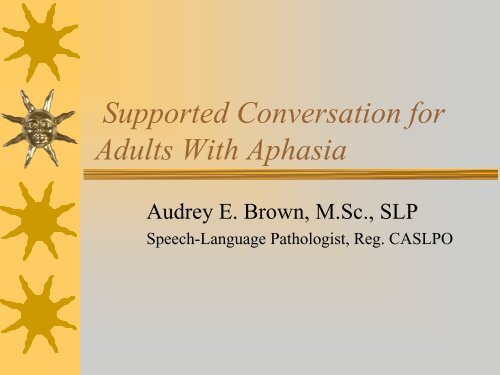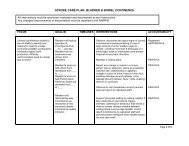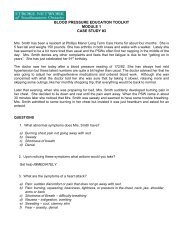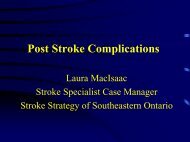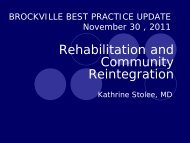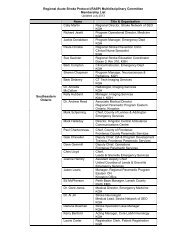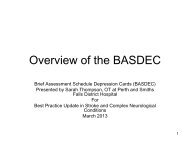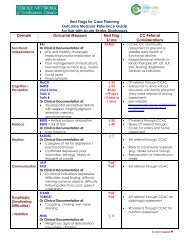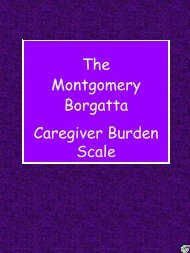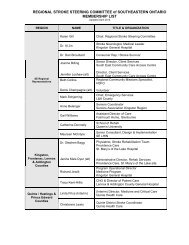Supported Conversation for Adults With Aphasia
Supported Conversation for Adults With Aphasia
Supported Conversation for Adults With Aphasia
You also want an ePaper? Increase the reach of your titles
YUMPU automatically turns print PDFs into web optimized ePapers that Google loves.
<strong>Supported</strong> <strong>Conversation</strong> <strong>for</strong><strong>Adults</strong> <strong>With</strong> <strong>Aphasia</strong>Audrey E. Brown, M.Sc., SLPSpeech-Language Pathologist, Reg. CASLPO
Take a moment…Think about:– A patient with communication deficit due tostroke (aphasia/dysarthria)– A message that he/she tried to give you (whatdid he/she say and/or do)– What you did– The result– How you felt– How this encounter may have influencedfurther attempts at providing care
An ExampleA woman with a left CVAKept saying “bathroom” when a nursecame in the door (this was not what shewanted to say)Nurse took her to the bathroom every timepatient requested
Result…Patient = Frustration–Crying– Anger outburstsStaff = Frustration– “She keeps saying bathroom, but when I takeher to the bathroom she doesn’t do anything”– Questioning patient’s competence
Outcomes - feelingsPatient– Isolation– Reluctance tocommunicate– Sees experience inhospital as negative– Sees self asincompetentStaff– See patient as“difficult”– Reducedsatisfaction atability to providecare
Ultimate OutcomesBoth parties– Dissatisfaction– True needs not met– Perceptions of each other’s abilities are inquestion
What is CONVERSATION? ALL COMMUNICATION Verbal and non-verbal Not just small-talk In hospital:– ADLs– Requests <strong>for</strong> in<strong>for</strong>mation– Signs and symptoms– Communicating diagnoses and future plans– Counseling
Goals: <strong>Supported</strong> <strong>Conversation</strong><strong>for</strong> <strong>Adults</strong> with <strong>Aphasia</strong> ©Teaching techniques to help health careprofessionals and caregivers communicatemore effectively with adults with aphasiaUsing these techniques to acknowledge theinherent competence of those with aphasia
Central Message of SCA ©Building communication “ramps” withpeople who KNOW more than they canSAY by…– ACKNOWLEDGING COMPETENCE– REVEALING COMPETENCE
Acknowledging CompetenceI know you know what you want to say– Admitting communication breakdown– Accepting responsibility <strong>for</strong> that breakdown– Make an attempt to reveal the intendedmessageCommunicates RESPECT
Revealing CompetenceThe onus is on YOU, the health careprovider, to:– Get your message IN– Help the survivor to get their message OUT– VERIFY that you have understood everythingcorrectly
Getting the Message IN(facilitating comprehension)Speak face-to-face1 idea at a timeShort sentencesPrint key wordsUsed gestures/facial expressionsUse YES/NO questionsUse simple pictures
Helping to Get Survivor’sMessage OUTGive them TIMEAllow them to write or draw if ableGestures and pointing (“Show me”)Use YES/NO questionsIdentify the general topic – print largeMove from general to specificUse an alphabet or picture board
VERIFY that you haveunderstood“Let’s see if I have this right”Allow <strong>for</strong> correction/clarificationTools:– YES/NO card– Black marker and paper to:•Circle key words• Cross out misunderstandings
Video DemonstrationWhat strategies does the health careprovider use to try to get her message INWhat strategies did she use to get thesurvivor’s message OUTWhat strategies could she have used to getthe message IN and OUT
Don’t <strong>for</strong>get…Be patient, persistent and honest –acknowledge difficultiesAccept responsibilityAcknowledge lack of timeNever leave without coming to anagreeable conclusion– Establish if needs are urgent– Get someone else to help you
Further In<strong>for</strong>mationResource booklets from the <strong>Aphasia</strong> InstituteAttend a <strong>Supported</strong> <strong>Conversation</strong> workshopVideo on web shortly: Visitwww.strokestrategyseo.ca <strong>for</strong> Tips and ToolsvideosConsult your facility’s friendly SLP <strong>for</strong> survivorspecificcommunication strategies


